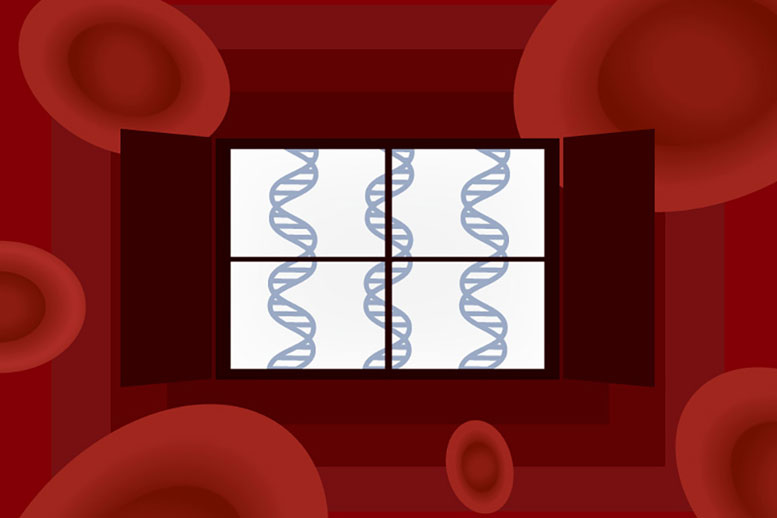
Researchers have enhanced cancer “blood biopsies” by using whole exome sequencing to track tumor DNA in blood samples.
A team of scientists at the Broad Institute, the Koch Institute for Integrative Cancer Research, Dana-Farber Cancer Institute, and Massachusetts General Hospital have developed a new method for making “blood biopsies” for cancer more effective by using whole exome sequencing to monitor tumor DNA from blood samples.
Reporting in Nature Communications, the team demonstrates that nearly 90 percent of a tumor’s genetic features can be detected in blood samples using whole-exome sequencing, and that the method can be effectively applied in up to 49 percent of patients with advanced cancer — a number likely to increase as sequencing becomes cheaper. This less-invasive tumor sampling, which can provide a window into the cancer’s genome, has a range of potential applications.
“Our ultimate hope is to use blood biopsies to exhaustively search for and characterize even the smallest remnants of tumors,” explains Viktor Adalsteinsson, co-first author on the paper and group leader at the Broad Institute, where he leads the Blood Biopsy Team. “And, as tumors evolve in more advanced stages of cancer, developing resistance or becoming metastatic, we might access time points that could be pivotal in deciding which therapies are right for that patient.”
This ability to detect and analyze cancer DNA from a patient’s blood sample is emerging as a promising alternative to invasive surgical biopsies, which can be difficult, painful, and costly — especially when tumors have appeared in locations that are challenging to access.
Blood biopsies (also called liquid biopsies) are poised to overcome many of these issues. They have the potential to allow doctors to track the progress of disease and treatment in real-time and to help researchers understand how tumors resist treatment with far greater resolution.
Understanding cancer without invasive procedures
Cells in the body, including tumor cells, regularly expel fragments of DNA into the bloodstream when they die. With blood biopsies, clinicians collect this “cell-free” DNA from a blood draw and then detect and comprehensively profile the fragments originating from cancer cells. Tracking these data could make it possible to monitor cancer recurrence, a patient’s response to treatment, and other clinically important features, all from blood samples.
The research and development arena for blood biopsies is frequented by both academic and industry players, but with scalable whole-exome sequencing, a team led by Adalsteinsson and colleagues Gavin Ha, Sam Freeman, Matthew Meyerson, J. Christopher Love, and Gad Getz is taking the field in a new and innovative direction. Love is a Broad associate member, associate professor of chemical engineering at MIT, and a member of the Koch Institute for Integrative Cancer Research at MIT
Compiling a whole exome from DNA fragments currently requires at least 10 percent tumor DNA in a blood sample, but the fraction of tumor DNA in the blood can vary wildly from patient to patient. Because of this variation, the team first desired an unbiased approach for detecting and measuring levels of cancer DNA before attempting whole-exome sequencing.
Across the field, many blood biopsy methods detect tumor DNA by screening for mutations in known cancer-related genes, but this targeted sequencing misses cancers without those mutations.
Co-first author Ha, a postdoc at the Broad Institute and Dana-Farber Cancer Institute (DFCI), led the development of a tool called ichorCNA that can analyze DNA fragments for mutation patterns nearly universal in cancer genomes, and as a result capture cancers with both known and unknown mutations. Ha focused on detecting stretches of DNA that have either fewer or greater copies in cancer cells, in contrast to healthy cells.
The research team tested and refined ichorCNA on 1,439 blood samples collected prospectively from 520 metastatic breast or prostate cancer patients at DFCI (a significant effort championed by medical oncologists Atish Choudhury, Daniel Stover, Heather Parsons, Nikhil Wagle, and colleagues).
Using this approach, the researchers found that in 33 to 49 percent of the metastatic breast and prostate cancer patients, depending upon whether one or multiple blood samples were examined, tumor DNA made up greater than 10 percent of the cell-free DNA in their blood — enough to make whole-exome sequencing of cell-free DNA feasible.
Then, to determine whether this sequencing of cell-free tumor DNA could offer the same level of insight into cancer genetics as a tissue biopsy could, the team compared surgically obtained tumor biopsies to data collected from whole-exome sequencing of cell-free DNA from a group of 41 patients. The researchers found that genetic data from blood whole-exome sequencing and tissue biopsies matched significantly across a number of genetic features, such as clonal somatic mutations (88 percent match) and copy number alterations (80 percent match).
These results support cell-free DNA whole-exome sequencing, from blood samples, as a potential substitute for metastatic tumor biopsy sequencing for many patients.
“Our study has demonstrated that we can get a cancer whole exome reliably, from blood; that it reflects the matched tumor biopsy; and that it can be done for a significant fraction of patients with metastatic cancer,” says Adalsteinsson, who was a postdoc in Love’s lab before joining the Broad Institute. “This validation suggests that we can use blood biopsies for large-scale genomic characterization of disease in patients with metastatic cancer.”
“It unlocks the potential for a lot of studies that we couldn’t do before,” adds Getz, institute member and director of the Cancer Genome Computational Analysis group at Broad and associate professor of Pathology and director of Bioinformatics at the Massachusetts General Hospital Cancer Center and Department of Pathology. “The technology will allow us to track the dynamics of cancer and understand the evolution of drug resistance, or the development of the metastatic state, in a way that isn’t possible through surgical biopsies.”
The new study improves the analysis pipeline for blood biopsies and allows it to be performed at expanded scale. The researchers are actively applying their work to thousands of patients with metastatic cancer who may otherwise not have their tumors biopsied.
“With this work, we now have a framework for the precise measurement and quality control of tumor DNA in the plasma, enabling the genomic analysis of blood biopsies with high technical accuracy,” explains Meyerson, institute member at Broad and professor of pathology at DFCI and Harvard Medical School.
Method is already in use with patients for cancer research
On the back of the team’s success, ichorCNA and subsequent whole-exome sequencing of cell-free DNA have been incorporated into a collaboration with the Broad Institute Genomics Platform to enable comprehensive mapping of metastatic and drug-resistant tumors from blood samples at scale. This approach has also been integrated into direct-to-patient research efforts underway at Broad, including the Metastatic Breast Cancer (MBC) Project, a patient outreach effort that collects saliva and tissue samples — and now blood samples — donated from metastatic breast cancer patients for DNA sequencing to further therapeutic research. Similar efforts to incorporate blood biopsies are underway in the Angiosarcoma Project and the upcoming Metastatic Prostate Cancer Project.
“We are excited about using blood biopsies to understand metastatic breast cancer, drug resistance, and tumor evolution, and to get a snapshot of the metastatic setting in patients who might not have available tissue from a metastatic biopsy,” says Nikhil Wagle, an associate member at the Broad Institute, deputy director of the Center for Cancer Precision Medicine at DFCI, and leader of the MBC Project. “With the Blood Biopsy Team’s latest results, it was clear that this technology had reached the right point for us to incorporate into the Metastatic Breast Cancer project.”
A means to perform large-scale blood biopsies could allow researchers and clinicians easy access to the cancer genome, with exciting implications for the way physicians monitor response to treatment, watch for recurrence, and more. The ability to frequently and noninvasively monitor cancer and its treatment could alter clinical trials, increase the resolution with which clinicians understand metastatic cancer, and potentially increase accessibility to quality precision medicine approaches.
“Using cell-free DNA to track cancer is not a new idea, but we’re developing the tools to understand how we can better qualify materials for those types of analyses, and we’re doing it in a way that allows us to look across the genome broadly,” says Love. “We’ve established quality metrics to make sure that this technology is cost-effective and scalable for thousands of patients and samples a year.”
This study was funded by the Gerstner Family Foundation, Janssen Pharmaceuticals, Inc., and a Koch Institute Support (core) grant from the National Cancer Institute.
Reference: “Scalable whole-exome sequencing of cell-free DNA reveals high concordance with metastatic tumors” by Viktor A. Adalsteinsson, Gavin Ha, Samuel S. Freeman, Atish D. Choudhury, Daniel G. Stover, Heather A. Parsons, Gregory Gydush, Sarah C. Reed, Denisse Rotem, Justin Rhoades, Denis Loginov, Dimitri Livitz, Daniel Rosebrock, Ignaty Leshchiner, Jaegil Kim, Chip Stewart, Mara Rosenberg, Joshua M. Francis, Cheng-Zhong Zhang, Ofir Cohen, Coyin Oh, Huiming Ding, Paz Polak, Max Lloyd, Sairah Mahmud, Karla Helvie, Margaret S. Merrill, Rebecca A. Santiago, Edward P. O’Connor, Seong H. Jeong, Rachel Leeson, Rachel M. Barry, Joseph F. Kramkowski, Zhenwei Zhang, Laura Polacek, Jens G. Lohr, Molly Schleicher, Emily Lipscomb, Andrea Saltzman, Nelly M. Oliver, Lori Marini, Adrienne G. Waks, Lauren C. Harshman, Sara M. Tolaney, Eliezer M. Van Allen, Eric P. Winer, Nancy U. Lin, Mari Nakabayashi, Mary-Ellen Taplin, Cory M. Johannessen, Levi A. Garraway, Todd R. Golub, Jesse S. Boehm, Nikhil Wagle, Gad Getz, J. Christopher Love and Matthew Meyerson, 6 November 2017, Nature Communications.
DOI: 10.1038/s41467-017-00965-y

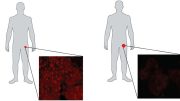
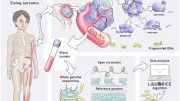

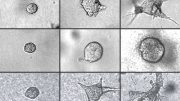
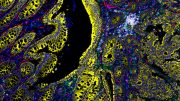

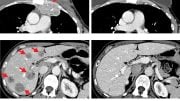
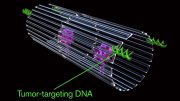
Be the first to comment on "Researchers Develop New Method for Making “Blood Biopsies”"